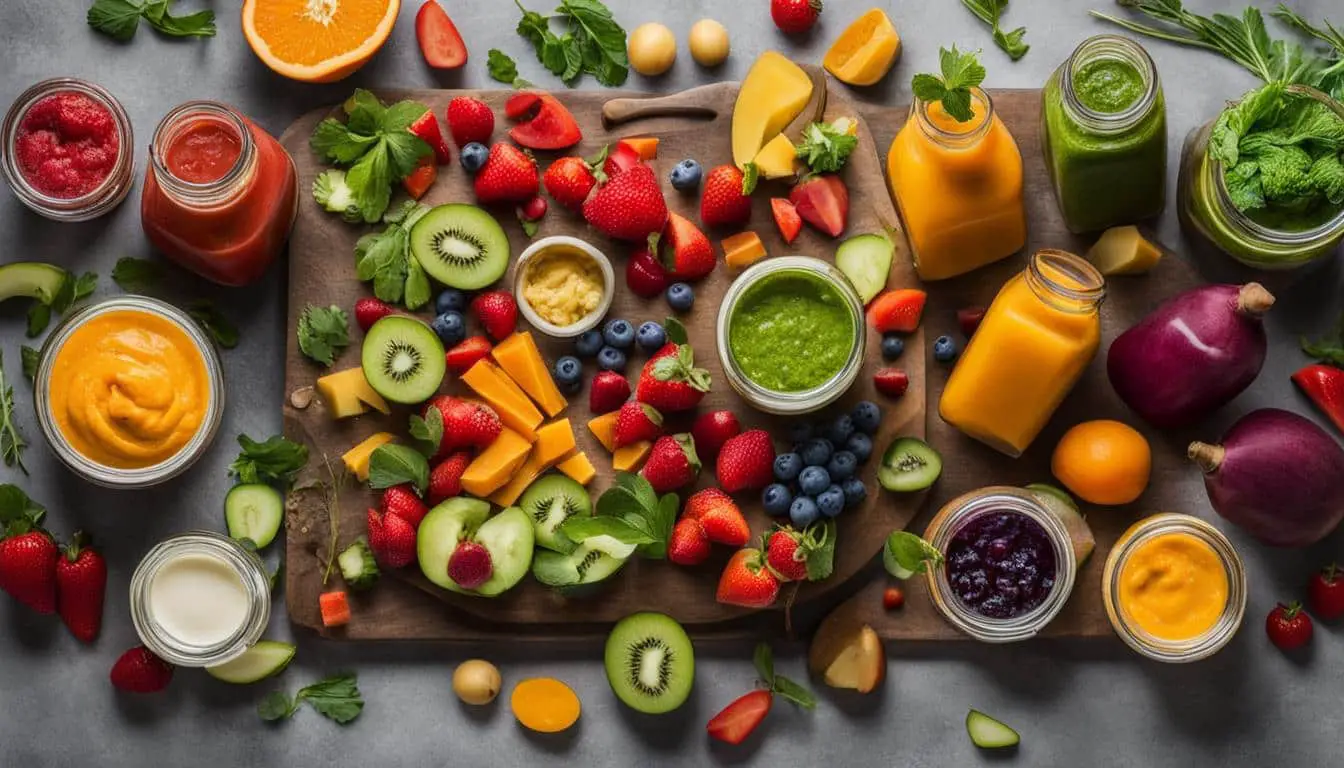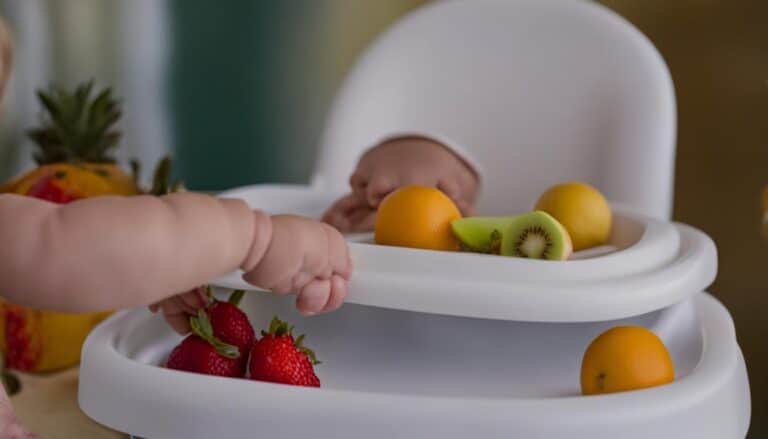DIY Baby Food Recipes: Healthy and Easy to Make
Making your own homemade baby food is a great way to ensure that your little one is getting healthy and nutritious meals. With the right tools and simple recipes, you can easily make stage 1 baby food purees that your baby will love. The best part is that you don’t need any special equipment – just a blender or food processor will do!
Some easy homemade baby food recipes include avocado puree, bean puree, blueberry puree, kiwi puree, mango puree, peach puree, whipped peanut butter, pineapple puree, strawberry puree, and banana puree. These recipes are suitable for babies aged 6, 7, and 8 months, but can also be enjoyed by older babies and toddlers.
To make the best homemade baby food, you’ll need a blender or food processor, water, formula, or breast milk to thin the purees as needed, a knife for chopping produce, spoons, bowls, ice cube trays for easy storage, freezer bags or baby food storage containers, and labels for proper organization.
When it comes to storing homemade baby food, the easiest method is to freeze them in ice cube trays and then transfer the frozen cubes into labeled freezer bags for up to 3 months. To make the best homemade baby food, use at least 1 cup of any base ingredient, thin the purees with water, formula, or breast milk, and taste the fresh ingredients for sweetness and tartness. You can also add fat or protein to the purees by stirring in yogurt, coconut cream, or avocado puree. Experiment with combining different purees for more complex flavors and textures, and consider adding texture to the purees by stirring in baby oatmeal or hemp seeds.
Key Takeaways:
- Homemade baby food recipes are easy to make with just a blender or food processor.
- Freeze homemade baby food in ice cube trays for easy storage and organization.
- Experiment with different purees and add-ons to create a variety of flavors and textures.
- Making your own baby food is a cost-effective option compared to buying pre-packaged options.
- Homemade baby food allows you to have control over the quality and types of ingredients used.
Baby Care: Tips for Making Homemade Baby Food
When it comes to baby care, making homemade baby food can be a great way to provide nutritious meals for your little one. Here are some tips for making the best homemade baby food.
Tip 1: Choose Fresh Ingredients
Start by selecting fresh, organic fruits, vegetables, and proteins for your homemade baby food. Opting for organic produce ensures that your baby is not exposed to harmful pesticides. Remember to wash and peel the fruits and vegetables before preparing them.
Tip 2: Use the Right Tools
To make homemade baby food, you’ll need a blender or food processor to puree the ingredients into a smooth and creamy texture. Ensure that the blender or food processor is clean and in good working condition before use.
Tip 3: Proper Storage
After preparing the homemade baby food, it’s important to store it correctly to maintain freshness and quality. Use ice cube trays to freeze small portions of baby food. Once frozen, transfer the cubes into labeled freezer bags or baby food storage containers. Remember to date and label each container for easy organization. Frozen homemade baby food can be stored for up to 3 months.
Tip 4: Thawing and Serving
When it’s time to serve the homemade baby food, thaw the desired amount in an airtight container in the refrigerator overnight. Gently heat the thawed baby food by placing it in a bowl of warm water or using a microwave on low power. Always test the temperature of the food before feeding it to your baby to avoid burns.
| Tips for Making Homemade Baby Food | |
|---|---|
| Choose fresh, organic ingredients | Ensure that the fruits and vegetables are washed and peeled before use. |
| Use a blender or food processor | Puree the ingredients into a smooth and creamy texture. |
| Properly store the baby food | Freeze small portions in ice cube trays and transfer to labeled freezer bags or storage containers. |
| Thaw and heat before serving | Thaw in the refrigerator overnight and gently heat before feeding. |
By following these tips, you can ensure that your homemade baby food is healthy, nutritious, and safe for your little one to enjoy. Making your own baby food allows you to have control over the ingredients and provides an opportunity to introduce a variety of flavors and textures to your baby’s palate. Give it a try and see the difference it can make in your baby’s development.
Baby Development: Benefits of Homemade Baby Food
Making homemade baby food offers numerous benefits for your baby’s development and overall health. When I make my own baby food, I have complete control over the quality and types of ingredients I use. Unlike store-bought options, homemade baby food does not contain any artificial colors, flavors, or sweeteners. This means my baby is not exposed to unnecessary additives that can potentially harm their health.
In addition, store-bought baby food can sometimes be subject to recalls, which can be worrisome. By preparing homemade baby food, I can have peace of mind knowing exactly what goes into my little one’s meals. I prioritize using fresh, organic ingredients to ensure the highest level of nutrition and safety for my baby.
Another advantage of homemade baby food is that it allows for greater variety in flavors and textures. By introducing homemade purees made from a wide range of fruits, vegetables, and proteins, I can support my baby’s growth and development while encouraging them to develop a diverse palate. With each homemade meal, my baby is exposed to different tastes and textures, which can help shape their preferences for healthy foods in the long run.
Not only is making homemade baby food beneficial for my baby’s health, but it also saves me money. Pre-packaged baby food can be expensive, especially when considering the amount needed to feed a growing baby. By preparing my own baby food, I can buy ingredients in bulk and batch cook, resulting in significant cost savings. I can also freeze the homemade purees in labeled freezer bags or baby food storage containers, allowing me to easily plan and organize my baby’s meals.
FAQ
How do I make homemade baby food?
To make homemade baby food, you’ll need a blender or food processor, water, formula, or breast milk to thin the purees as needed, a knife for chopping produce, spoons, bowls, ice cube trays for easy storage, freezer bags or baby food storage containers, and labels for proper organization. Use the blender or food processor to puree the ingredients, thin with liquid as desired, and store in labeled containers or freeze in ice cube trays for later use.
How long can I store homemade baby food?
Homemade baby food can be stored in the freezer for up to 3 months. It is recommended to freeze the purees in ice cube trays and then transfer the frozen cubes into labeled freezer bags for easy storage and organization.
Can I mix different purees together?
Yes, you can experiment with combining different purees to create more complex flavors and textures for your baby. This can help introduce them to a wider variety of tastes and encourage them to develop a diverse palate.
How do I thaw frozen baby food?
Thaw the frozen baby food by placing the frozen cubes into an airtight container in the fridge overnight. This gradual thawing method ensures that the food remains safe and retains its quality.
Can I add additional ingredients to the purees?
Yes, you can add fat or protein to the purees by stirring in ingredients such as yogurt, coconut cream, or avocado puree. This can help enhance the nutritional value of the baby food and provide added texture and flavor.
Is homemade baby food more cost-effective than store-bought options?
Yes, making your own baby food can be a more cost-effective option compared to buying pre-packaged baby food. By using fresh ingredients and preparing the food at home, you can save money in the long run.
Are there any benefits to making homemade baby food?
Homemade baby food offers several benefits for your baby’s development and overall health. By making your own baby food, you have control over the quality and types of ingredients used, ensuring that your baby is not exposed to unnecessary additives. Homemade baby food recipes are also more likely to be nutritionally balanced and can provide a wider variety of flavors and textures compared to store-bought options. Additionally, homemade baby food can be easily frozen and stored, allowing you to batch cook and simplify your days.






